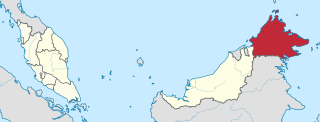
Sabah is a state of Malaysia located on the northern portion of Borneo. Sabah has land borders with the Malaysian state of Sarawak to the southwest and Indonesia's Kalimantan region to the south. The Federal Territory of Labuan is an island just off the Sabah coast. Sabah shares maritime borders with Vietnam to the west and the Philippines to the north and east. Kota Kinabalu is the state capital city, the economic centre of the state, and the seat of the Sabah state government. Other major towns in Sabah include Sandakan and Tawau. As of the 2015 census in Malaysia, the state's population is 3,543,500. Sabah has an equatorial climate with tropical rainforests and abundant animal and plant species. The state has long mountain ranges on the west side which forms part of the Crocker Range National Park. Kinabatangan River, the second longest river in Malaysia runs through Sabah, and Mount Kinabalu is the highest point of Sabah as well as of Malaysia.
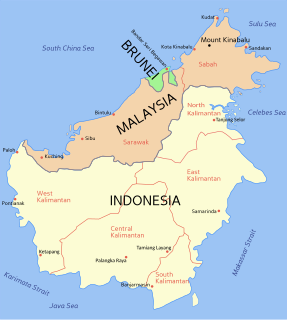
East Malaysia, also known as Sabah, Sarawak and Labuan or Malaysian Borneo, is the part of Malaysia on the island of Borneo, the world's third largest island. It consists of the Malaysian states of Sabah, which is closer to the Philippines than to mainland Malaysia, Sarawak in the west, and the Federal Territory of Labuan. Labuan is an island in its small archipelago of the same name due north of Brunei; its closest land mass is with Sabah. It lies to the east of Peninsular Malaysia, the part of the country on the Malay Peninsula. The two are separated by the South China Sea.

Kota Kinabalu is the state capital of Sabah, Malaysia. It is also the capital of the Kota Kinabalu District as well as the West Coast Division of Sabah. The city is located on the northwest coast of Borneo facing the South China Sea. The Tunku Abdul Rahman National Park lies to its west and Mount Kinabalu, which gave the city its name, is located to its east. Kota Kinabalu has a population of 452,058 according to the 2010 census; when the adjacent Penampang and Putatan districts are included, the metro area has a combined population of 628,725.

The Interior Division is an administrative division of the state of Sabah, Malaysia. It occupies the southwest portion of Sabah, bordered by the neighbouring state of Sarawak on its west. With an area of 18,298 square kilometres, it covers 24.9% of Sabah's territory and is home to approximately 14.7% of Sabah's total population. The largest town in the Interior Division is Keningau. Other main towns in this division include Beaufort, Kuala Penyu, Sipitang, Tambunan and Tenom.

Keningau is the capital of the Keningau District in the Interior Division of Sabah, Malaysia. It is the fifth-largest town in Sabah, as well one of the oldest. Keningau is between Tambunan and Tenom. The town had an estimated population of 173,130.

The Murut are an indigenous ethnic group, comprising 29 sub-ethnic groups inhabiting northern inland regions of Borneo. The Murutic languages are a family of half a dozen closely related Austronesian languages. The Murut can be found mainly in Sabah, Malaysia including in Sarawak, Malaysia, Brunei and Kalimantan, Indonesia.
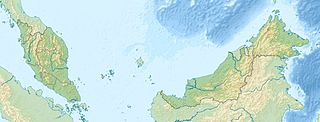
Mount Trusmadi or Trus Madi is a mountain located at the Interior Division of Sabah, Malaysia. It is considered as the second highest mountain in both Sabah and Malaysia at 2,642 metres (8,668 ft), after Mount Kinabalu with the mountain offer a tougher climbing challenge than the latter.

Sabah Football Club is a football club with ownership by Sabah Football Club Sdn Bhd. The football club competes in Malaysia's football league representing the state of Sabah in Borneo. They currently compete in Malaysia's top division professional football league, the Malaysia Super League. The team's home matches are played at the 35,000 capacity Likas Stadium in Kota Kinabalu, the capital city of Sabah.
Datuk Seri Panglima Stephen Robert Evans SPDK, JP is a politician, public administrator and author from Sabah, Malaysia.

The Sabah Museum is the state museum of Sabah, Malaysia. It is sited on 17 hectares of land at Bukit Istana Lama in Kota Kinabalu, the state capital.

The history of Sabah can be traced back to about 23–30,000 years ago when evidence suggests the earliest human settlement in the region existed. The history is interwoven with the history of Brunei and the history of Malaysia, which Sabah was previously part of and is currently part of respectively. The earliest recorded history of Sabah being part of any organised civilisation began in the early 15th century during the thriving era of the Sultanate of Brunei. Prior to this, early inhabitants of the land lived in predominantly tribal societies, although such tribal societies had continued to exist until the 1900s. The eastern part of Sabah was ceded to the Sultan of Sulu by the Sultan of Brunei in 1658 for the former helping a victory over Brunei enemies, but many sources stated it had not been ceded at all. By the late 19th century, both territories previously owned by Sultan of Brunei and Sultan of Sulu was granted to British syndicate and later emerged as British North Borneo under the management of the North Borneo Chartered Company. Sabah became a protectorate of the United Kingdom in 1888 and subsequently became a Crown colony from 1946 until 1963, during which time it was known as Crown Colony of North Borneo. On 16 September 1963, Sabah merged with Malaya, Sarawak and Singapore to form Malaysia.
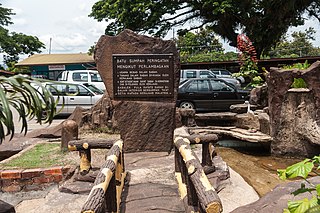
The Keningau Oath Stone is a monument in Keningau, Sabah erected to commemorate the terms in which the former British Crown Colony of North Borneo joined the former colony of Sarawak and the other states of the Federation of Malaya to form Malaysia.

The 2015 Malaysian Census reported the population of Sabah at 3,543,500, being the third most populous state in Malaysia and have the highest non-citizens population at 870,400. However, as Malaysia is one of the least densely populated countries in Asia, Sabah is particularly sparsely populated with most of the population concentrated in the coastal areas since towns and urban centres have massively expanded. The statistics in 1970 reported the population of Sabah with only 653,600, with both the state and its neighbour of Sarawak has about the same number of foreign nationals. By 1980, the state population saw a sudden increase to over 1,011,000 following the influx of refugees who fleeing a conflict in the neighbouring southern Philippines. At the same time, Sabah economic booms in the primary sector also attracted large legal workers from both Indonesia and the Philippines. This increase to over 1,863,600 in 1991, 2,603,485 in 2000, and by 2010 turned into 3,117,405. Sabah has 900,000 registered migrant workers working in agriculture, plantation, construction, services and domestic workers. While the total number of illegal immigrants are predicted to be as more than one million due to the past controversial regularisation for political reasons, with most of them are believed to have been categorised as "other bumiputera" category group in the country statistics. Sabah also seen a great increase in the number of expatriates, with most of them comes from China, Taiwan, South Korea, Japan, Australia and Europe.

The Keningau District is an administrative district in the Malaysian state of Sabah, part of the Interior Division which includes the districts of Beaufort, Keningau, Kuala Penyu, Nabawan, Sipitang, Tambunan and Tenom. The capital of the district is in Keningau Town.

The Nabawan District is an administrative district in the Malaysian state of Sabah, part of the Interior Division which includes the districts of Beaufort, Keningau, Kuala Penyu, Nabawan, Sipitang, Tambunan and Tenom. The capital of the district is in Nabawan Town.

The Tambunan District is an administrative district in the Malaysian state of Sabah, part of the Interior Division which includes the districts of Beaufort, Keningau, Kuala Penyu, Nabawan, Sipitang, Tambunan and Tenom. The capital of the district is in Tambunan Town.
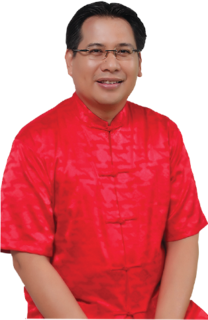
Yamani Hafez bin Musa is a Malaysian politician. He is the Member of Parliament (MP) for Sipitang in Sabah. Presently he is a member of the Malaysian United Indigenous Party or Parti Pribumi Bersatu Malaysia (BERSATU), a component of Perikatan Nasional (PN) coalition. He was formerly representing the United Malays National Organisation (UMNO) party in the Barisan Nasional (BN) ruling coalition then before turning to an Independent politician in 2018; and joining BERSATU later in 2019.

Sandakan Heritage Museum is a museum located at the 1st floor of Wisma Warisan building in Sandakan of Sabah, Malaysia. The museum building is located next to the Sandakan Municipal Council and is part of the Sandakan Heritage Trail.
The COVID-19 pandemic was confirmed to have reached Sabah, Malaysia, in March 2020. As of 2 December 2020, there are 29,267 confirmed cases.




















